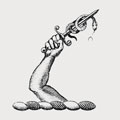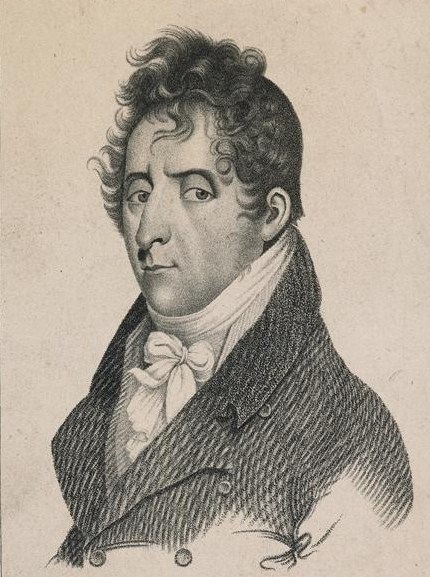Daniel Callaghan was born on the 7th June 1786, the second son of Daniel Callaghan (d.1824) of Sidney House, Cork and Mary Barry of ‘Donalee’; his sister Catherine married James Joseph Roche. Of the six brothers, John and Patrick seem to have concentrated on business. Daniel and Gerard were MP’s, and the youngest two, Richard and George were a barrister, and a soldier respectively.
 Arms – Az in base a mount vert on tb sinister a hurst of oak trees therefrom issaant a wolf passant ppr. Crest: A naked arm holding a sword with a snake entwined. Motto: Fidus et audax. Estates: In the county of Cork. Seat: Lotabeg
Arms – Az in base a mount vert on tb sinister a hurst of oak trees therefrom issaant a wolf passant ppr. Crest: A naked arm holding a sword with a snake entwined. Motto: Fidus et audax. Estates: In the county of Cork. Seat: Lotabeg
Dan was one of the M.P.s for Cork between 1830 and 1849
This is his obituary from

The Gentlemans magazine 1849
Daniel Callaghan Esq MP. Sept 29 1849
At his residence Lotabeg near Cork aged 63 Daniel Callaghan esq MP for that city. He was the second son of Daniel Callaghan esq, one of the most enterprising and successful merchants of Cork. He was first returned to Parliament in 1829 by a combination of men of all parties, and supported the Reform Bill. He also became a Repealer, and despite of opposition from various quarters, remained for twenty years, the representative of his native city. Mr Callaghan had great knowledge of business and was intimately conversant with the social state of Ireland. He had acquired a large property in the provision trade. At one period it was the wish of some of the leading members of the Whig party to have made him Vice President of the Board of Trade, but Lord Melbourne objected on account of his having been a pledged Repealer, and at a subsequent period when that objection would not have been pressed against him, Mr Callaghan had become indifferent to office. He died of cholera, but for some months previously his health had been declining.

In 1820 he intervened in a duel which followed his brother Gerard’s unsuccessful candidacy for Cork, insisting that his younger brother Patrick was ‘perfectly satisfied’ after his first shot severed the finger of Christopher Hely Hutchinson, one of the Members. The duel came after an ill-humoured five-day election contest as Gerard conceded defeat, he boasted that the prospect of the new king’s death would enable him to stand again ‘at no very distant period’. His remarks were denounced by Christopher Hely Hutchinson, one of the Members, who a few days later lost a finger in a duel with Callaghan’s younger brother Patrick. ‘The general feeling seems to be that Gerard Callaghan put his brother in the place he was afraid to take himself’, commented one observer.
It has been stated that at the 1826 Cork by-election he refused on ‘public principle’ to vote for Gerard, who had abandoned the family religion to become a ‘red hot Protestant’, but at the 1829 by-election he lent him his full support, providing ‘both money and personal exertions’.
The unseating of Gerard as a government contractor supplying the navy created a vacancy in 1830, for which Daniel Callaghan came forward with the unlikely support of the local Brunswick Club. [The Brunswick Clubs were part of a campaign to deny Catholics the right to enter both houses of the British parliament. Numbering roughly 200 clubs and claiming 150,000 members between September 1828 and December 1829.]
The Cork Brunswick Club, it was said, had determined on ‘putting a Catholic in for a while, in order to keep the seat for one of their most virulent, violent and obnoxious members’, and considered it ‘better to vote for a Papist than a liberal Protestant’. Lord Francis Leveson Gower, the Irish secretary, observed that there was nothing in Callaghan’s character to ‘induce government to interfere against him’ and declined to assist his opponent. Pressed at the nomination, Callaghan praised the ‘beneficial influences’ of the established church but denied being his brother’s locum, although he admitted that at the next election he would ‘retire before him rather than come into such an unnatural collision’. After a 13-day contest of ‘unparalleled severity’ he was returned 16 votes ahead of his rival. A petition against his return on the ground of his also being a government contractor came to nothing. He took his seat, 26 Apr. 1830.
At the 1830 general election it was expected that he would retire in favour of Gerard, but to the fury of the Brunswick Club he offered again after family friends, with whose decision the brothers had ‘agreed to abide’, determined that he had the ‘best chance of success’.
At the 1832 general election Callaghan, who had ‘originally professed himself opposed’ to repeal of the Union, after some hesitation ‘pledged himself to vote for it’ and was re-elected with the support of O’Connell. He was defeated as a Liberal in 1835, but seated on petition, and successfully contested the next three general elections. He was apparently ‘tipped’ for appointment under the Liberals as vice-president of the board of trade, but Lord Melbourne, the premier, ‘objected on account of his having been a pledged repealer’. He died from cholera in September 1849.
There is more detail in the History of Parliament online